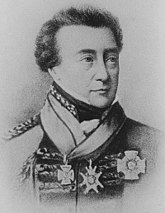William Inglis (British Army officer)
| Sir William Inglis | |
|---|---|

Sir William Inglis
|
|
| Born | 1764 |
| Died | 29 November 1835 (aged 70–71) Ramsgate, Kent, England |
| Allegiance |
|
| Service/ |
|
| Years of service | 1779 to 1835 |
| Rank | Lieutenant general |
| Battles/wars | |
| Awards | Knight Commander of the Order of the Bath |
| Other work | Governor of Cork |
Lieutenant General Sir William Inglis, KCB (1764 – 29 November 1835) was a British officer of the French Revolutionary and Napoleonic Wars.
Inglis served at several of the heaviest engagements of the Peninsula War, was wounded numerous times and earned national fame through his exhortation "Die hard 57th, die hard!" to his regiment as he lay seriously wounded behind their ranks at the height of the Battle of Albuera.
Thanks to Inglis' leadership, the regiment held and the battle was won and although his wounds nearly proved fatal, Inglis returned to action again two years later to see the war out as a brigadier. Post-war, Inglis was knighted and served in several military governorships including a spell as Governor of Cork, in which position he died in 1835.
Almost nothing is known of Inglis's childhood, save that he was born in 1764, the third son of Dr. William Inglis, head of the College of Surgeons, Edinburgh. His mother was Margaret Spens, daughter of Thomas Spens. He was born in Edinburgh Scotland. No details of his education are known. Indeed, the first undisputed records about him which are known are those indicating that he was commissioned into the 57th Regiment of Foot as an ensign in 1779, although he did not actually join the regiment for another two years, meeting them in New York at the height of the American Revolutionary War in 1781. Following the British defeat, Inglis and his regiment travelled to Nova Scotia and Inglis spent the next ten years in Canada.
Whilst stationed in North America, Inglis became a lieutenant in 1782 and a captain in 1785. When his unit returned to Britain in 1791, the French Revolution had occurred and Inglis was engaged during the next two years maintaining order in the Midlands. When war with France broke out in 1793, the 57th was dispatched to the army of the Duke of York during his unsuccessful campaign against the French in the Low Countries. The same year, Inglis and his men were also briefly detached to a failed expedition to Brittany, but by the time the campaign had faltered in the winter of 1794, Ingis was back in Belgium.
...
Wikipedia
